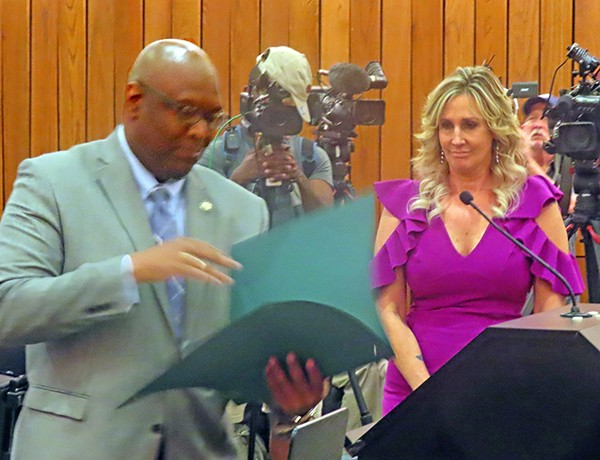Among the consequences of the current pandemic is that various public events, some of them long-scheduled, are now off the calendar until some undefined future point — or canceled outright. There is, of course, a third option, involving reliance upon the various forms of virtual presence the cybernetic age has made possible.
An example of the latter is the Democrats’ selection of delegates to the party’s upcoming summer convention.
Local Democrats met at Kirby High School for two major-party presidential nominating conventions the weekend before last to choose “selectors” for the official party caucuses, which, for Democrats in the 9th Congressional District, were set for the same location this coming weekend. Those for the adjoining 8th District, which includes part of Memphis and Shelby County, were designated for the Carroll County Fairgrounds.
In either case, not anymore. Instead, the party will be conducting its delegate selection online at various times across the state on Saturday. Each candidate’s selectors will caucus on conference calls via separate phone lines. Procedures have not yet been decided on for at-large delegates and those in a P.L.E.O. category (for “party leaders and elected officials”).

political consultant Michael Life, City Councilman Dr. Jeff Warren, and state Representative Dwayne Thompson.
• When he made his successful race for the City Council Super District 9 last year, Jeff Warren, a physician, used medical metaphors for the improvements he proposed to bring to city government. “For a Healthier Memphis” was his catch-all slogan.
As a member of Mayor Jim Strickland‘s newly convened COVID Task Force, the councilman is now involved in such a clinical role in earnest. This week, he dispatched a prescription of sorts to constituents via email. Included in his recommendations:
1. Please do not panic and stockpile food and supplies. Our supply chain can provide what we need. Reach out to a neighbor and offer to sell or donate supplies if you did and this will allow our stores to restock and address everyone’s needs.
2. Practice social distancing and avoid crowds of any kind. Many restaurants and businesses are leading the way in removing tables and chairs, and the city is now limiting any gathering to fewer than 50 people.
3. Wash your hands, practice good hygiene, and avoid touching your face.
4. Stay home and avoid contact with as few people as possible until we have actual local data to see where we are on the epidemic curve.
Apropos the latter point, Warren was among the attendees at what may have been the last organized public political event to be held in these parts for a while, a fundraiser last week for Democratic state House District 97 candidate Allan Creasy, held in a back-tent area at Celtic Crossing, where Creasy serves as a bartender.
• Another legislative candidate, Jerri Green, a Democrat seeking the state House seat in District 83, suspended campaigning and also issued some similar online advice, part of which read as follows:
All of the following are looking for donations of goods, monetary gifts, and some even need volunteers to help: Mid-South Food Bank, Hope House Memphis, Dorothy Day House, Trinity United Methodist Church.
Then, look for other simple things you can do: Support your favorite small business or restaurant if you can now, or buy gift cards for later use.
Tip folks extra if you can. Uber Eats drivers, bartenders, baristas, you name it, they need it!
Find your local favorite musician’s latest album and BUY it. They will be booking fewer gigs.
Check on friends, neighbors, co-workers (text them!). This is intense, and we need to vent a little.
Say a prayer for RBG. Seriously.
What I won’t be doing during this time: campaigning. I won’t be fundraising or door-knocking or generally being a politician.
• Interesting message received from MoneyGeek, a start-up company proffering financial information and advice: In the midst of the coronavirus outbreak, the White House recently released a statement announcing that it would once again seek to repeal Obamacare after the Supreme Court agreed to hear arguments challenging the ACA. MoneyGeek recently completed a study analyzing the risk to patients with pre-existing conditions and found that over 12 million Americans could lose coverage, and that would include losing coverage for vaccines and treatment related to coronavirus. Tennessee would be one of the most impacted states if these laws change:
* Over 325,000 people (8.2 percent of the population of Tennessee), are either uninsured or on the ACA today, and have a declinable condition. This population would suffer the most, either losing coverage or having difficulty securing new coverage.
* 11 percent of the population is on ACA programs/direct-to-consumer insurance plans.
* Over 500,000 people (14.7 percent of the population) are currently uninsured.
 Jackson Baker
Jackson Baker  Jackson Baker
Jackson Baker  Jackson Baker
Jackson Baker  Jackson Baker
Jackson Baker  Jackson Baker
Jackson Baker 